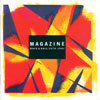MAGAZINE : RAYS & HAIL 1978-1981
- Shot by Both Sides
- Definitive Gaze
- Motorcade
- The Light Pours out of Me
- Feed the Enemy
- Rhythm of Cruelty
- Back to Nature
- Permafrost
- Because You're Frightened
- You Never Knew Me
- A Song From Under the Floorboards
- I Want to Burn Again
- about the Weather
- Parade
Label : Virgin
Time : 68:49
Release Year : 1987
Review (AllMusic) : The definitive single-disc collection of Magazine, a perfect starting point for the neophyte, Rays and Hail ../covers the three years of the band's existence with highlight after highlight on display. Devoto's mastery of a lyrical and musical approach that wedded chilly paranoia with explosive punk and post-punk energy - as suspicious of emotion as Wire or the Gang of Four, yet at the same time more accepting and obsessed with emotion than most others at the time - resulted in a series of jawdroppingly grand songs. Such compositions as "Feed the Enemy" and "Because You're Frightened" showcased the balance well, not to mention the excellent performances of such bandmembers as John McGeoch on guitar and Barry Adamson on bass. The only real rarity per se is the original single take on "Shot By Both Sides," one of the many landmark tracks Devoto and Pete Shelleywrote in early days together, and which, in Magazine's hands, become a fierce statement of intent. The incorporation of keyboards, in particular, helped give Magazine its smart edge, Devoto sounding both commanding and distanced on such tracks as "Back to Nature" and "A Song From Under the Floorboards" as guitars and queasy synth tones meshed to create weird, alien atmospheres. "The Light Pours out of Me" may well go down as Magazine's most epic, evocative song among the well-known numbers, McGeoch's guitar hitting truly dramatic heights as the relentless rhythm pounds forward. However, the inclusion of "Permafrost" on this collection makes for what could arguably be the band's most stunning moment. With Devoto's at once blunt yet evocative image of a relationship of some sort stretched beyond a breaking point captured in the lyrics, all that the music needed to do was capture the same disturbed vision. That it did, featuring a slow trudge rhythm treated to sound flat and unnatural, Adamson's fretless bass sounding warning notes as it goes.
